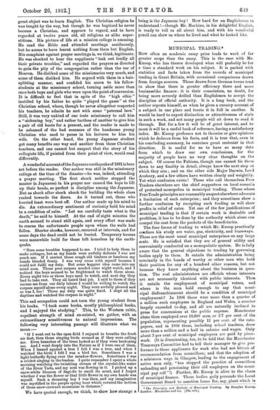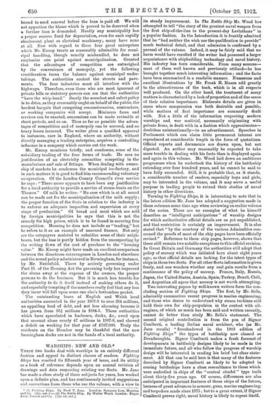MUNICIPAL TRADING.* How often an academic essay prize leads to
work of far greater scope than the essay. This is the case with Mr. Knoop, who has thence developed what will probably be for a time a standard work on his subject. It is packed with statistics and facts taken from the records of municipal trading in Great Britain, with occasional comparisons drawn from foreign sources. Those drawn from German towns tend to show that there is greater efficiency there and more businesslike finance : it is their consolation, no doubt, for being more severely drilled than Englishmen to accept the discipline of official authority. It is a long book, and the author repeats himself, as when be gives a cursory account of a subject in one place and treats it in full in another. It would be hard to expect distinction or attractiveness of style in such a work, and not many people will sit down to read it through. But for a few it will be of great interest, and to more it will be a useful book of reference, having a satisfactory index. Mr. Knoop professes not to theorize or give opinions which he deduces from his facts, and it is true that, even in his concluding summary, be exercises great restraint in that direction. It is useful for us to have so many data from which to draw our own conclusions, for the majority of people have no very clear thoughts on the subject. Of course the Fabians, though one cannot tie them down to any finality in detail, always know the next stop at which they aim ; and on the other side Major Darwin, Lord Avebury, and a few others have written clearly and weightily. Yet what confusion exists ! Those who call themselves Free Traders elsewhere are the chief supporters on local councils of protected monopolies in municipal trading. Those whose Free Trade principles are reasonably suspect elsewhere advocate a limitation of such enterprise ; and they sometimes show a further confusion by excepting such trading as will show profits in relief of rates. Yet one of the few justifications of municipal trading is that if certain work is desirable and profitless, it has to be done by the authority which alone can compel the cost from the pockets of the beneficiaries.
The four forms of trading to which Mr. Knoop practically confines his study are water, gas, electricity, and tramways. These are the most usual municipal enterprises on any largo scale. He is satisfied that they are of general utility and conveniently conducted on a monopolistic system. He is fully aware that the general objections to trading by 5overning bodies apply to them. It entails the administration being nominally in the hands of worthy or other men who hold their position for any of a hundred other reasons, but not because they know anything about the business in ques- tion. The real administrators are officials whose interests are not necessarily identical with public interests. Then it entails the employment of municipal voters, and where is the man bold enough to say that muni- cipal disfranchisement should be a condition of municipal employment P In 1906 there were more than a quarter of a million such employees in England and Wales, a number largely exceeded to-day, and all are naturally inclined to press for concessions at the public expense. Manchester alone then employed over 18,000 men, or 2.7 per cent. of the population, representing possibly 11 per cent. of the rate- payers, and in 1908 these, including school teachers, drew more than a million and a half in salaries and wages. Only about 3 per cent. of municipal employees are paid by piece- work. (It is illuminating, too, to be told that the Manchester Tramways Committee had to tell their manager to give pre- ference to those applicants for work who had not letters of recommendation from councillors; and that the adoption of a minimum wage in Glasgow, leading to the engagement of active men only, "has stopped the practice of councillors unloading and pensioning their old employees on the muni- cipal pay roll "!) Further, Mr. Knoop is alive to the chaos of municipal finance. These bodies gaily persuade the Local Government Board to sanction loans for, say, plant which is • The Principles and Methods of Municipal Trading. By Douglas Knoop. London : Macmillan and Co. [10s. net.]
bound to need renewal before the loan is paid off. We will not apportion the blame which is proved to be deserved when a further loan is demanded. Hardly any municipality has a proper reserve fund for depreciation, even for such rapidly obsolescent plant as electrical machinery.; many have none at ail. Now with regard to these four great enterprises which Mr. Knoop treats as reasonably admissible for muni- cipal handling, though usually mishandled, he does not emphasize one point against municipalization. Granted that the advantages of competition are outweighed by the convenience of monopoly, yet the following consideration turns the balance against municipal under- takings. The authorities control the streets and pave- ments. The four industries must all interfere with the highways. Therefore, even those who are most ignorant of private bills or statutory powers can see that the authorities
have the whip-hand." Surely the soundest and safest policy is to drive, as they reasonably ought on behalf of the public, the hardest bargain that competing concessicrnnaires, contractors, or working companies will accept. Minimum fares and services can be exacted, concessions can be made revisable at short periods, and so on. Thus so far as possible the advan- tages of competition and of monopoly can be secured, and no heavy losses incurred. The writer gives a qualified approval to instances, rare in England, where an authority, without directly managing a trading enterprise, acquires a controlling influence in a company which carries out the work.
Mr. Knoop mentions briefly, and condemns, some of the subsidiary trading of the four forms of trade. He sees no justification of an electricity committee competing in the manufacture and sale of fittings. When dealing with owner- ship of markets he condemns the municipal ice-factory, and in such matters it is good to find him recommending voluntary co:operation. Of the London County Council's river service he says : " There never appears to have been any justification for a local authority to provide a service of steam-boats on the Thames." Of milk he -writes : " No case which is at all sound tan be made out for the municipalization of the milk supply ; the proper function of the State in relation to the industry is to enforce an adequate inspection and supervision at every stage of production." Of bread and meat which are sold by foreign municipalities he says that this is not the remedy for high prices, which is to be found in securing free competition. Housing he does not include as "trading," but he refers to it as an example of unsound finance. Not only are the ratepayers mulcted to subsidize some of their neigh- bours, but the loss is partly hidden from the unsuspecting by the writing down of the cost of purchase to the "housing value." Mr. Knoop might have made an excellent comparison between the disastrous extravagance in London and elsewhere and the sound policy administered in Birmingham, for instance, by Mr. Nettlefold. There by actively governing under Part II. of the Housing Act the governing body has improved the slums away at the expense of the owners, the proper persons to do the business. But it is much less trouble for the authority to do it itself instead of making others do it, and especially tempting if the members really feerthat any loss they incur will fall upon some one else's bottomless pocket.
The outstanding loans of English and Welsh local authorities amounted in the year 1907-8 to over 284 millions, an appalling load of debt, and not less alarming because it has grown from 851 millions in 1884-5. Those authorities which have speculated in harbours, docks, &c., owed upon that account alone nearly 47 millions in 1907-8, and showed a deficit• on working for that year of 2567,000. Truly the residents on the Humber may be thankful that the new Immingham docks are not in the hands of a local authority.



















































 Previous page
Previous page